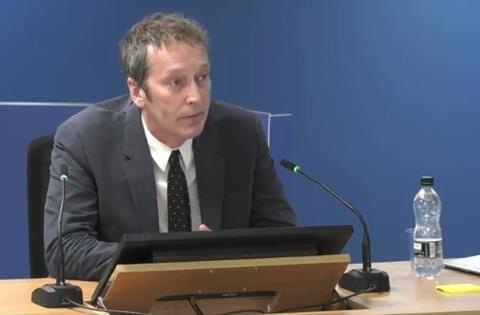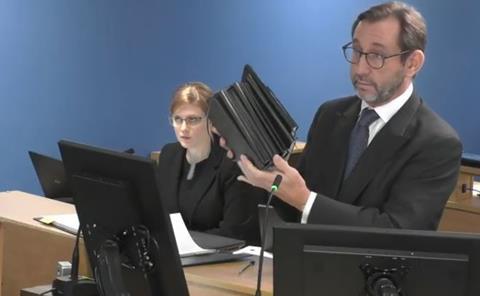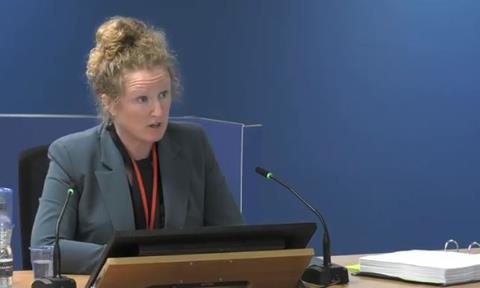Client says bending procurement rules ‘not uncommon’ as fire safety consultant savaged for failings in reports
Kensington and Chelsea Tenant Management Organisation this week exited the witness box – albeit temporarily – after nine days of evidence to the inquiry into 2017’s Grenfell Tower fire.
The arm’s length management organisation responsible for the Royal Borough of Kensington and Chelsea’s council homes was the client for Grenfell’s botched refurbishment, which led to 72 deaths in the fire.

Last to give evidence was former KCTMO director of assets and regeneration Peter Maddison, who insisted on Monday that he did not believe that refurbishment design and build main contractor Rydon’s winning bid had been unrealistically low.
The inquiry heard that questions had been raised about the sustainability of the bid by both the TMO executive board and the TMO’s legal advisers. Maddison said he had no concerns that the £9.2m figure was problematic or that the £800,000 in further savings that KCTMO was seeking would make it so.
Maddison said the TMO’s cost advisers Artelia had not flagged any fears about the bid price. At one stage he said the fact that Rydon had delivered the project on budget was a sign that the bid price had been correct.
Inquiry lead counsel Richard Millett QC responded: “The fact that the project was delivered on budget is not of great assistance to us, given that we know what happened to the building.”
Elsewhere in his evidence, Maddison was asked about a secret meeting between senior TMO figures involved in the Grenfell refurbishment and Rydon bosses while the OJEU procurement process was still live.
The contact, which was aimed at securing Rydon’s agreement in principle to delivering savings to meet KCTMO’s £8.4m budget before it was confirmed as preferred bidder, went against legal advice and left the organisation open to challenge by the unsuccessful bid teams.
Maddison denied “playing fast and loose” with procurement rules. “I think it’s about trying to work within the rules and assessing risks as appropriate,” he said. “I don’t think it’s uncommon for clients to have to weigh up these sort of risks in a process that can be challenging.”
Maddison was also asked about his surprise submission of five diaries and eight notebooks to the inquiry last week. He said nobody investigating the fire had ever asked him to hand in any documents related to the project, but suggested the TMO legal team had been aware of the books because he had used some of them to create a spreadsheet “timeline” that shaped his witness statement.

He is expected to return to the inquiry next year to give further evidence on KCTMO’s management of Grenfell Tower and the organisation’s interaction with residents.
On Tuesday, expert witness on building control issues Beryl Menzies flagged failings with the Royal Borough of Kensington and Chelsea’s scrutiny of the refurbishment proposals that were submitted by the project team.
Her report to the inquiry said the information submitted to the council’s building control department at the time of the full plans application was “insufficient to demonstrate compliance with the Building Regulations”.
Menzies’ report said RBKC building control (BCB) ought to have requested further information about the proposed works, and, in particular the cladding panels and insulation.
“The BCB also failed to acknowledge that some information was out of date and contradictory,” she said. “For example, the fact that the Exova fire strategy did not address the actual proposals indicated on the submitted plans.”
Menzies’ report also said that no in-depth review of the suitability of the cladding that was proposed for Grenfell – Reynobond PE 55 aluminium composite material (ACM) cladding – appeared to have been carried out by building control officers.
“There just seems to be a fundamental failure, as I describe it, a basic failure with fire spreading consequences of not gaining that package information,” Menzies told Tuesday’s session.
Inquiry fire safety expert witness Dr Barbara Lane gave evidence on Wednesday and was questioned on her report assessing the quality of advice given to the refurbishment project team by Exova. It concluded that the firm’s work had been “entirely inadequate”.
Arup director Lane said Exova’s reports to project architect Studio E and project client KCTMO failed to meet minimum standards in numerous respects and was professionally negligent at times.
Exova was appointed to the project in 2012 and tasked with producing a fire safety strategy for the existing building as well as one for the refurbishment. It was not kept on as part of the project team when Rydon was appointed as design and build main contractor in 2014, although it did continue to provide advice on an ad-hoc basis.
Lane’s report said the consultant’s “primary failing” was not looking properly at the risk of the spread of fire on external walls that overcladding the tower posed – a key factor on 14 June 2017, when much of Grenfell was engulfed in flames. The inquiry has already determined that the combustible ACM cladding and insulation added as part of the refurbishment were the reason that fire spread so rapidly across the outside of the tower.
Lane said that despite being aware in April 2012 that the plan for Grenfell Tower’s refurbishment would involve overcladding, no reference was made to such work in any of the fire safety strategy reports Exova produced.

She told Wednesday’s hearing she stood by the view in her report that Exova’s failure to identify that overcladding Grenfell was part of the refurbishment yet attesting the works would have “no adverse effect” on external fire spread – without actually analysing the proposals – was “very serious evidence of professional negligence”.
Exova’s “no adverse effect” suggestion was repeated in several generations of its fire safety strategy for the project and came with the rider that the view would be confirmed in a “future issue of the report”. The future issue was never written.
“I don’t understand how you can give a view if you haven’t seen information,” Lane said.
She accepted that a consultant would have been able to offer an opinion on the potential for fire to spread from one building to another without having seen detailed plans for a scheme, but not on the safety of the work itself.
Lane said she would have expected a reasonably competent fire safety engineer to know that the building was being overclad by the time a project got to RIBA Stage C. She said that as an “absolute bare minimum” a fire safety strategy at that stage should have set out statutory guidance for insulation, cavity barriers and the external surface if materials had yet to be finalised.
Lane also criticised the “wholly insufficient” two-hour site visit to Grenfell Tower that one Exova staff member made and which fed into the firm’s existing building fire safety strategy.
She added that the eventual report contained “wholly inappropriate” assumptions that Grenfell Tower had been constructed in compliance with the prevailing standards of the day, and that it had been maintained and that any amendments had been carried out with the approval of the regulating authority.
“The whole point of an existing fire safety strategy is to be clear on what is there,” Lane said.
On Thursday, Lane told the inquiry that Exova had given incorrect advice at key points when members of the Grenfell refurbishment project team were “reaching for information” on crucial details
She pointed to the significance of email exchanges in September 2014 and March 2015 when project team members were asking Exova associate Terry Ashton for advice on issues such as the need for cavity barriers and the internal fire-performance of overcladding.
Ashton responded that if the insulation set to go behind the cladding was combustible, cavity barriers would be required. Lane said the advice was incorrect.
“It doesn’t matter if the insulation is combustible or not, you are required to provide cavity barriers,” she said.
Ashton was also sent a datasheet for the insulation product Celotex RS5000 – which had a class 0 certificate and should not have been used on the tower. He was asked to confirm that cavity barriers would not be needed in conjunction with the insulation because of its class 0 rating.
Ashton replied that not all products with a class 0 rating were non-combustible. Lane said the answer was inadequate.
“You’ve got professionals asking really specific questions about [part] B4 [of Approved Document B of the Building Regulations], as they’re entitled to do,” she said. “They needed to hear that insulation needs to be a material of limited combustibility , which is not class 0, and they needed to hear, regardless, cavity barriers were required around the window.”
She said Ashton should have at least warned the project team that using insulation with a class 0 test certificate – as the RS5000 had – on Grenfell Tower would be a fundamental breach of the Building Regulations.
Lane also disputed Exova’s opening statement to the inquiry, asserting that its “continuing obligations” on the project ended at around the time Rydon was appointed main contractor in March 2014.
She said Exova’s suggestion that it had been “substantially excluded” from the project was a “very strong” way to describe a reduced role.
Lane said the firm’s own fee proposal had suggested that it would provide advice on an ad-hoc basis as the project progressed beyond RIBA Stage E and that it had continued to answer questions from the project team and invoice for its work.
“I see people contacting the fire safety engineer when they think they need some fire safety advice,” she said. “That’s not the classification of exclusion in my mind.”
The inquiry continues.


























No comments yet